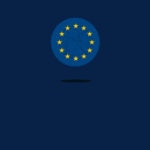BBVA joins launch of EU blockchain platform
BBVA is one of the first five banks invited to join a blockchain forum organized by the European Commission (EC) in Brussels to, subsequently, join the launch of the IATBA, an European platform to promote the use of blockchain. The purpose of this publicly-sponsored initiative is to garner support from private blockchain and DLT experts to contribute to outline the EU’s strategy regarding these technologies.

The European Union does not want to miss the blockchain train. For this purpose, the EC convened representatives from public institutions and the private sector in a conference entitled ‘Uniting EU Industries to lead blockchain technologies.’ BBVA was one of the EU enterprises invited to take part in this debate forum on blockchain technology.
The forum was held to garner support for the European Union’s blockchain-related strategy. The EC invited representatives from the private sector, governments and public bodies to foster innovation and harness the possibilities enabled by the blockchain technology in Europe. On BBVA’s behalf, Carlos Kuchkovsky, Head of Research & Development New Digital Business, joined Mariya Gabriel, European Commissioner for Digital Economy and Society, and Roberto Viola, Director-General of DG CONNECT at the European Commission in a round table.
Carlos Kuchkovsky stressed the important role this common project could have in terms of establishing blockchain best practice and standards and at avoiding fragmentation on a European level. He also believes that it is an opportunity for Europe, which is positioned – with its current level of data protection and privacy management – to influence global standards.
According to Kuchkovsky, blockchain and other new technologies - artificial intelligence, for example - have to be understood as simple pieces that make digital ecosystems reliable. In this regard, he hopes that these types of projects will contribute to providing more clarity to the regulatory uncertainty that currently surrounds the use of these technologies. Nevertheless, he believes it is "essential to establish a system of governance that aligns the different participating industries and their objectives", which should represent different sizes of organizations and sectors.
Finally, he reiterated that blockchain is not only a technology, but it engenders new business models creating a "tokenized economy" and "paving the way to a decentralised economy in the future.”
"At BBVA we fully support this initiative and are ready to get to work", he said. He also singled out BBVA's role as a pioneering financial company, a company that by virtue of its vast experience is equipped to contribute to the launch of the platform.
IATBA launch
Precisely, the EC welcomed the collaboration of the private industry with the launch of the ‘International Association for Trusted Blockchain Applications’ born and headquartered in Europe.
The IATBA, a publicly promoted initiative, aims to bring together companies interested in exploring the potential of blockchain and distributed ledger technologies to transform digital services at a global level. BBVA is one of the five banks invited by the EC to join this partnership, due to its interest and experience in the use of blockchain and distributed ledger technology.
As the EC itself announced, this association will work to promote interoperability between these technologies, develop sector-specific guidelines and protocols, promote EU standards across the world and provide information for the implementation of Europe’s blockchain strategy. As a result of this exchange between private sector leaders and public representatives, the association could be legally set up as early as first quarter of 2019.
In parallel, on April 2018, the European Commission has started working on rolling out the European Blockchain Partnership (EBP), which has already been signed by 27 countries, including Spain. The purpose of this partnership is to develop a trusted, secure and resilient European Blockchain Services Infrastructure meeting the highest standards in terms of privacy, cybersecurity, interoperability and energy efficiency, and fully compliant with EU law.